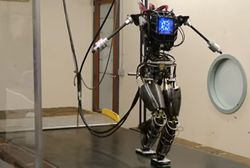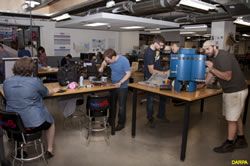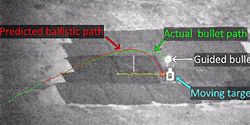Worcester Polytechnic Institute to Compete in DARPA Robotics Challenge June 5-6, 2015
DARPA competition puts robots from 24 international teams through difficult tasks of mobility and manipulation; ultimate goal is to develop robots able to help humans in disasters.
At TU-Automotive Detroit, Velodyne LiDAR to Help Make Sense of Sensor-Driven Future for Autonomous Vehicles
Which Way for Sensors? Velodynes Wolfgang Juchmann to Offer LiDAR Market Leaders POV During Nations Biggest Connected Car Event
24 of the World's Best Robots in Los Angeles Area to Compete in DARPA Robotics Challenge Finals
DARPA Robotics Challenge June 5-6, 2015 at The Fairplex, Pomona, California
SRI International to Showcase High-Impact Platform Technologies at DARPA Robotics Challenge Expo
Demos to Include High-Efficiency Humanoid, Micro-Robots, Low-Cost Robotic Hand, and Wearable Robotics
Humanistic Robotics Teams up with DARPA to Elevate Safety at the Robotics Challenge Finals
Wireless Emergency Stop Technology Now Required for all Challenge Entries
5 things to know about the DARPA Robotics Competition
From Lyndsey Gilpin for TechRepublic: The DARPA Finals will be held in Pomona, California from June 5-6, and the robots that come out of it could make some big impacts (or take over the world). Here's a summary of what you should know.
1. It began with the desire to improve humanitarian assistance and disaster relief
The Fukushima disaster in Japan in 2011 was an inspiration for the competition, according to Dr. Gill Pratt, the DRC program manager. The team realized we never know what the next disaster will be, but we need technology to help us better address these types of disasters with better tools and techniques. And robots have massive potential.
"The particular part that we've chosen to focus on, here, is technology for responding during the emergency part of the disaster during the first day or two," Pratt said in a media briefing several weeks before the competition. "So this is not about, for instance, robotics for doing the restoration of the environment many, many weeks, years after the disaster, but rather the emergency response at the beginning." Cont'd..
Patrick Henry Student to Attend DARPA Robotics Challenge
Jared Voight to cover event on behalf of Polaris
DARPA Fast Track Program Invites Non-Traditional Roboticists to Help Bolster National Security
Robotics Fast Track foresees cost-effective development of new capabilities by engaging cutting-edge groups and individuals who traditionally have not worked with the federal government
Five High School Students Win Robots4Us Video Contest-and a Trip to the DARPA Robotics Challenge Finals
Winners created compelling short videos about the future of robots in society and will get the chance to discuss their ideas and see current cutting-edge robots in action
DARPA's Self-guided Bullets
"True to DARPAs mission, EXACTO has demonstrated what was once thought impossible: the continuous guidance of a small-caliber bullet to target," said Jerome Dunn, DARPA program manager.
Tern Tech Offshoots Show Potential for New UAS Capabilities at Sea
DARPA aiming to share breakthrough, low-cost technologies to improve launch and retrieval of unmanned aerial systems and maritime situational awareness
Robots to Drive Polaris RANGER at DARPA Robotics Challenge
DARPA Robotics Challenge (DRC) Finals to be held June 5-6, at the Fairplex, in Pomona, Calif.
New DARPA Programs Simultaneously Test Limits of Technology, Credulity
New starts show that no one can out-pace, out-innovate or out-acronym DARPA
DARPA Shares Its Vision for the Future
New biennial report describes Agencys mission in the context of todays fast-changing world, and current and upcoming areas of focused investment
Records 31 to 44 of 44
Featured Product

Zimmer Group - THE PREMIUM GRIPPER NOW WITH IO-LINK
IO-Link is the first standardized IO technology worldwide for communication from the control system to the lowest level of automation.
Robotics and Automation - Featured Company

Palladyne AI Corp.
Welcome to Palladyne AI, where we unleash the power of robotics with our revolutionary AI software platform for the physical world. In a world where robots are progressing toward human-like adaptability, seamlessly navigating dynamic environments and conquering complex tasks with unparalleled efficiency, Palladyne AI stands as the beacon of innovation toward that future reality. Through our cutting-edge artificial intelligence (AI) software platform, we are redefining the boundaries of robotics. Our goal is simple: Help companies with autonomy in their robotics operations by addressing key challenges of traditional robotic deployments.



